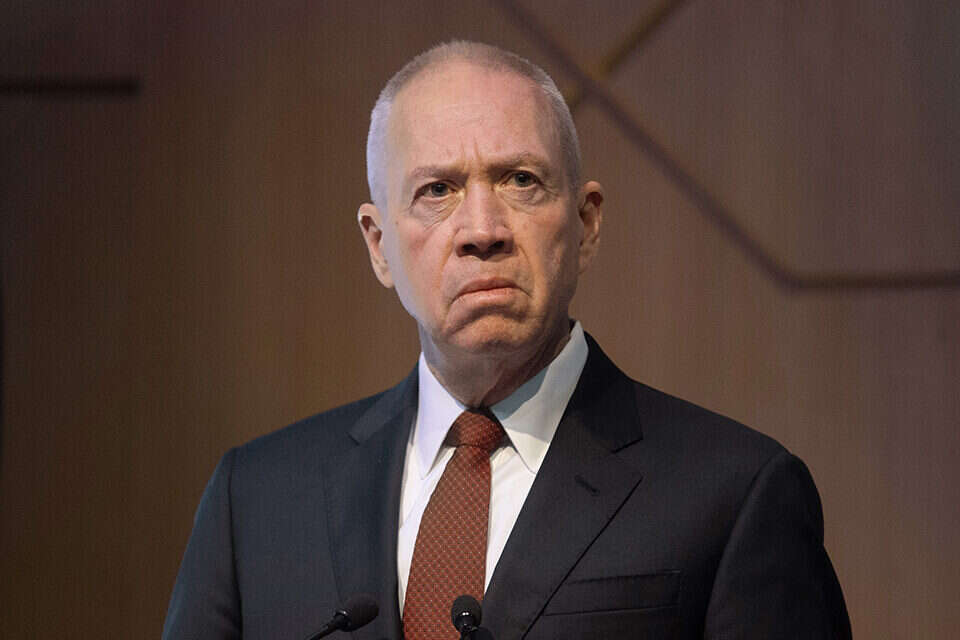Defense Minister Yoav Galant said, "This is internal military terminology. Not every woman from restraints or avenues will tell us to go through a phase or not to go through."
His remarks were perceived or distorted in a way that can be understood as not caring about the residents of the envelope, and therefore he issued a clarification: "What was meant was that the discourse on the transition between the stages was intended to create a common language between the military and political echelons, and not for the benefit of public discourse. Residents of Ofakim and Sderot were and still are at the top of my mind." In other words, the residents of the envelope are important, but there is no place for their opinions in the discourse, because the discourse is military and political, but not public.
Gallant sees himself as a patriarch, a statesman who defends a community of subjects (and subjects), but he is not. Gallant is an elected official. Masuda Meshderot is not a subject worth defending, she is a civilian, and she is also Galant's boss, and besides "creating a common language between the military and political echelons" - Galant is also accountable to Ms. Masouda.
In the United States, for example, where the individual is the sovereign, an elected official who excuses a certain statement by saying that it is "not in the interest of public discourse" would be held in contempt, because there every elected official owes his place to the public discourse. Nothing is said in a public forum that cannot be publicly audited.
Gallant is not to blame, he is a product of the system.
Israel has democracy with an asterisk. True, subjects vote here for the Knesset, but the real government is in the hands of "professionals": security, for example, is entrusted to security personnel, who never make mistakes, and if they do, they will already examine themselves as to why they made a mistake (see an internal military commission of inquiry). A citizen is forbidden to "criticize" the security establishment not in discourse, not in the media, not through his representative.
Censorship forbids saying how many tanks the IDF has, the enemy knows, the IDF knows, but Masuda is not allowed to know, because if she does, she may think there are too few of them, and she may vote for a party that will demand more tanks in the IDF and fewer budgetary pensions. She must not challenge the professionals, who always know everything.
I guess that's not a problem, because there's no way we'll get stuck in a war on two fronts and we won't have enough tanks. Right, Gallant?
The separation between "nobles" (what we call professionals) and subjects is not unique only to security. In education, for example, there is no place in the Western world with so little parental involvement. Education here is controlled by the Histadrut and the teachers' union.
Israel is at the bottom of the tables of achievements in education, but God forbid that Masuda be allowed to supervise her children's teachers, God forbid that she discover that NIS 30,<> per student per year barely manages to bring about third world results.
Communication? Broadcasting boards determine what is or is not allowed to broadcast. Masuda has a sign, but she doesn't really decide. Regulation? Officials will decide whether there is compliance with standards and regulations. Prosecutor's Office? Never make a mistake.
Income tax? Moles are set arbitrarily like in a Turkish bazaar. Budget cuts? If the arrangements permit. Foreign relations? The ambassador does whatever he wants. Unloading at the port? If the forklift woke up. Flight? If there is no strike.
The separation between "nobles" (what we call professionals) and subjects is not unique only to security. In education, for example, there is no place in the Western world with so little parental involvement. Education here is controlled by the Histadrut and the teachers' union
Trial? God forbid that the public and its elected representatives criticize. And not just criticism, God forbid an elected official make a decision without the attorney general's approval, not to mention judicial review of the Basic Laws, which is unprecedented in democratic countries.
During two thousand years of exile, we could not exercise either our private sovereignty or national sovereignty, and in the establishment of the state we sacrificed private sovereignty in order to receive national sovereignty. We sacrificed the individual on the altar of the Mapai-General Staff apparatus. Maybe that was true then, but it can't continue.
In order for us to survive, political power in the country must shift from the "professionals" to the Masuda Meshderot, it must turn from giving to civic.
Wrong? We'll fix it! If you find a mistake in the article, please share with us

